
Career Coach Reveals Four Telltale Red Flags That Allow Employees To Identify A Lousy Manager
There’s an old trope saying that employees don’t leave companies, they leave bosses.
Oftentimes, it’s true. Especially for younger folks. A 2018 Udemy study found that 51% of Millennials and Gen Z’ers are likely to have quit because of a bad manager (51%), but their older colleagues aren’t that far behind (43%).
However, these numbers would probably be even bigger if more people knew how to identify lousy leadership.
And that’s where Sam DeMase comes in. The career coach who spent over a decade in the corporate world recently released a video, highlighting the biggest red flags she noticed in managers.
More info: apowermood.com | TikTok
Career coach Sam DeMase spent 11 years in corporate recruiting, training, and leadership development
Image credits: apowermood
And she just shared the biggest red flags she noticed in lousy bosses
@apowermood Manager red flags to look out for. #corporatetok #careeradvice #communicationskills ♬ Love You So – The King Khan & BBQ Show
Hopefully, they will allow people to spot toxic behavior and make changes accordingly before it makes them miserable
Image credits: apowermood
Image credits: Craig Adderley (not the actual photo)
Image credits: LinkedIn Sales Navigator (not the actual photo)
Image credits: apowermood
We managed to get in touch with DeMase and the career coach agreed to tell us what inspired her video. “Most companies don’t invest enough time and resources in training their managers on people leadership skills,” she told Bored Panda. “They promote people into leadership roles who are good at the hard skills but not the soft skills.”
If you spot one or multiple of these warning signs in your own manager, DeMase suggests requesting a weekly or biweekly 1-on-1 with them (assuming you don’t already have one). “This is essential for both of you as you need to be aligned when it comes to short-term and long-term goals, strategic direction changes, and your ongoing development,” she explained. “The agenda for your 1-on-1 should include questions you have on current projects, your weekly wins and challenges, goals status check-in, and at least 15 minutes on your professional development areas in which you excel, skills you’re actively working on, and your short and long-term career goals.”
Be persistent. “If things aren’t improving, be direct and clearly communicate your needs. For example, ‘I’m overwhelmed with my current workload. Can we take a look at my list of projects, prioritize, and delegate so I can be set up for success moving forward?’ You can also escalate up to human resources if they are not open to communication. Document everything so you can go in prepared. In terms of the emotional/mental toll that comes with having a toxic boss, I strongly recommend talking to close friends, family, or a therapist (if you are able) about what you’re going through. Start looking for a new job before you hit your breaking point.”
Also, keep in mind that some managers put their incompetence on display even before you start working with them. DeMase believes that advocating for yourself and understanding the manager’s style starts during the interview process. “When interviewing, it’s important to know how to identify a toxic boss. Here are some things you can do: during your interview with the person, report to- inquire about their leadership style. You can ask: ‘What is your leadership philosophy?’ ‘How many people have you developed and promoted in the past year?’ ‘What is your preferred style of communication?’ ‘What are your workplace boundaries?’ ‘How do you encourage healthy work/life balance on your team?’ ‘What do you love about working here?'”
“If they don’t offer it, always ask for an interview or informal chat with someone who will be on your immediate team (aka someone who already reports to who you would report to),” Demase added. “This is key. Don’t accept a job without first chatting with someone who will be your peer. Ask them questions about the work environment, the leader’s style, how many people have been promoted in the past year, work/life balance and boundaries, what they like about being part of the team, etc.”
Image credits: apowermood
So far, DeMase’s video has been viewed nearly 323K times and serves as a reminder that nowadays workers are educating themselves and demanding more from their employers.
Over 47 million Americans voluntarily quit their jobs in 2021. The unprecedented mass exit from the workforce was spurred on by Covid and is now widely called the Great Resignation.
Worker shortages are apparent everywhere from gas stations to dentist offices, of which many have reduced their hours of operation because they simply can’t find new people to replace those who have quit.
The Great Resignation, we’re told, has upended the relationship between workers and the labor market.
But Professor of Management Practice at Harvard Business School and management consultant Joseph B. Fuller, and D’Arbeloff Professor of Business Administration at the same establishment William R. Kerr think these talks are overblown.
“A record number of workers did quit their jobs in 2021, it’s true. However, if you consider that number in the context of total employment during the past dozen years… you can see that what we are living through is not just short-term turbulence provoked by the pandemic but rather the continuation of a long-term trend,” they wrote.
“From 2009 to 2019, the average monthly quit rate increased by 0.10 percentage points each year,” the academicians pointed out. “Then, in 2020, because of the uncertainty brought on by the Covid-19 pandemic, the resignation rate slowed as workers held on to their jobs in greater numbers. That pause was short-lived. In 2021, as stimulus checks were sent out and some of the uncertainty abated, a record number of workers quit their jobs, creating the so-called Great Resignation.”
“But that number included many workers who might otherwise have quit in 2020 had there been no pandemic. We’re now back in line with the pre-pandemic trend, which is one that American employers are likely to be contending with for years to come.”
When you think about it, this can’t be bad, right?
DeMase’s insights have really resonated with people
Can you post a list without a tiktok video in it? You are exposing your readers to identity theft, data mining, and worse.
I am not sure here. Managers that seek to develop you more and faster are great, but I would not discount a manager that takes a hands off approach. Compared to the micro manager, control freak, never satisfied, and unrealistic expectations manager, the hands off variety would be a relief.
Can you post a list without a tiktok video in it? You are exposing your readers to identity theft, data mining, and worse.
I am not sure here. Managers that seek to develop you more and faster are great, but I would not discount a manager that takes a hands off approach. Compared to the micro manager, control freak, never satisfied, and unrealistic expectations manager, the hands off variety would be a relief.




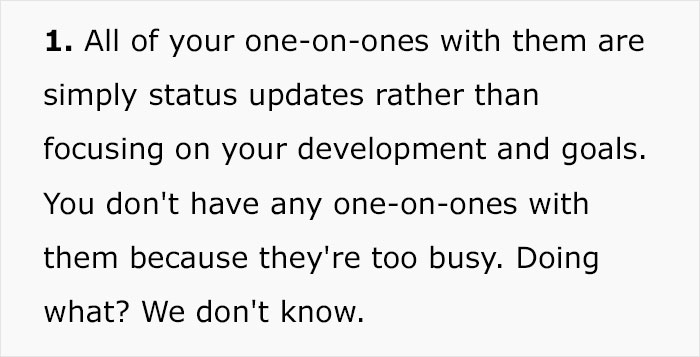




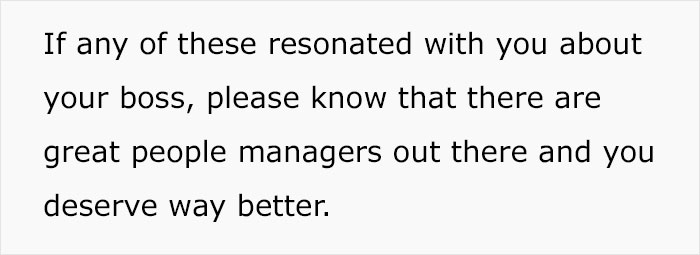




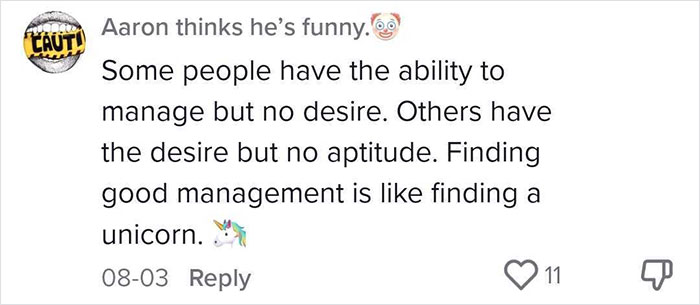



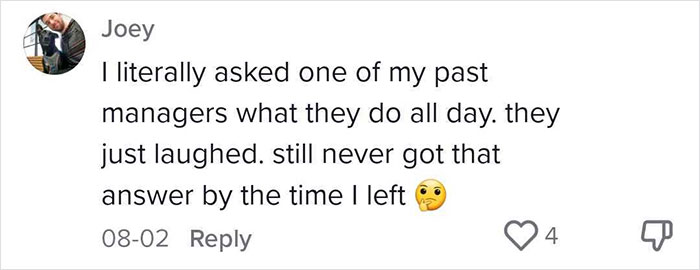
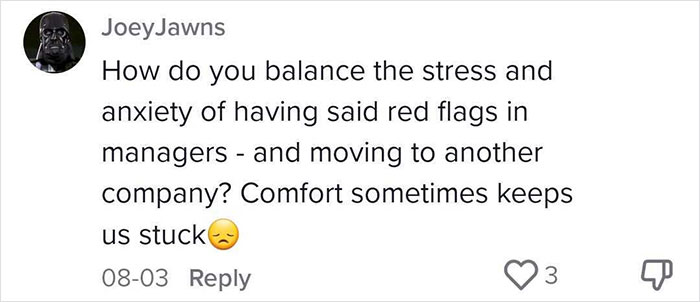
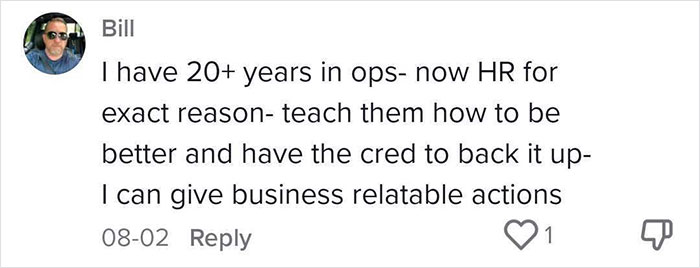

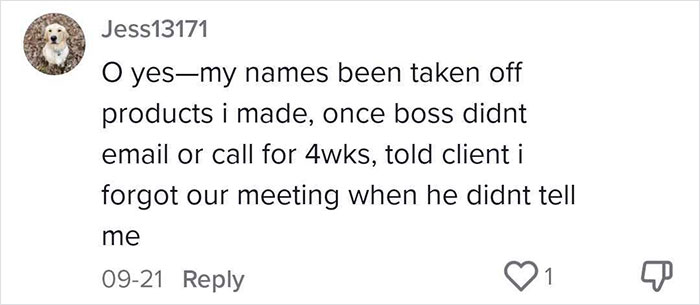








20
4